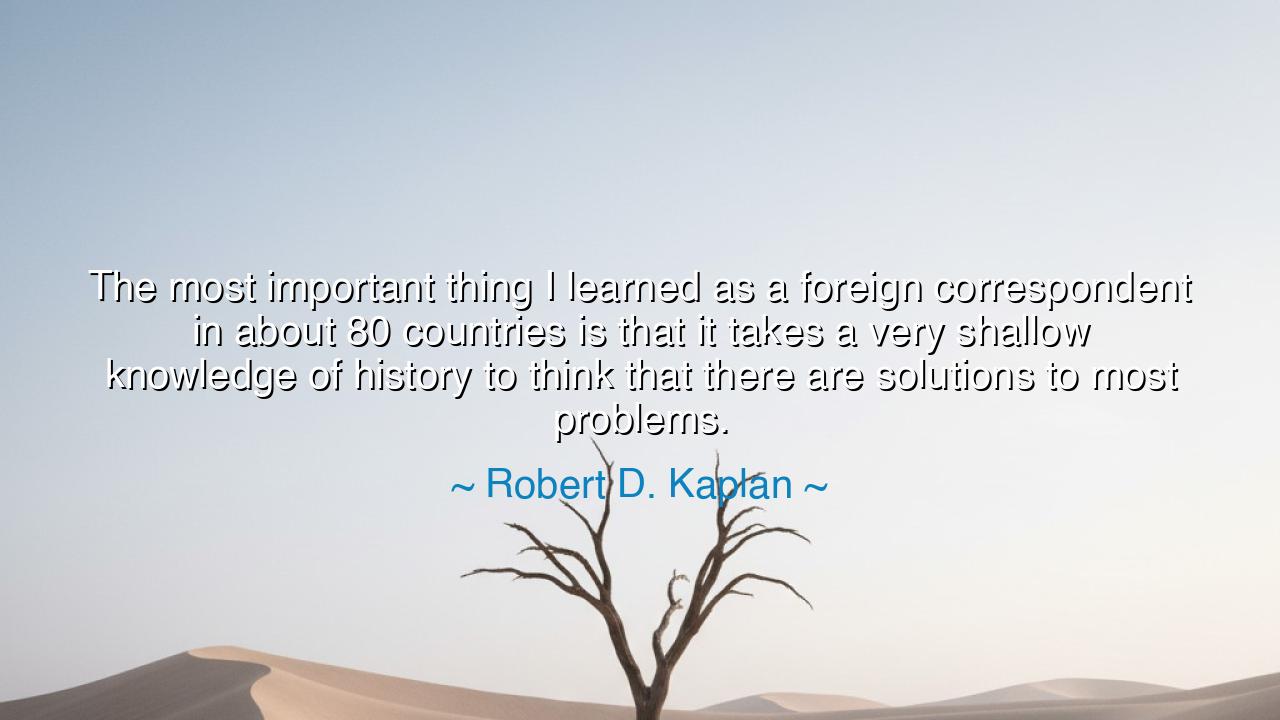
The most important thing I learned as a foreign correspondent in
The most important thing I learned as a foreign correspondent in about 80 countries is that it takes a very shallow knowledge of history to think that there are solutions to most problems.






“The most important thing I learned as a foreign correspondent in about 80 countries is that it takes a very shallow knowledge of history to think that there are solutions to most problems.” Thus spoke Robert D. Kaplan, the wandering observer of nations and chronicler of human strife, whose eyes have seen the world not through the veil of theory but through the dust and blood of its reality. In these words lies the humility of a man who has traveled through empires and ruins, who has heard the songs of hope and the cries of despair, and who has come to understand that history is not a clean ledger of causes and effects, but a living, tangled organism — vast, ancient, and slow to change.
Kaplan’s reflection is born from a lifetime of bearing witness — from deserts and jungles, capitals and battlefields — and it is a warning to those who believe that every human struggle has an easy cure. The shallow knowledge of history he speaks of is the arrogance of simplicity, the illusion that the world bends easily to logic or will. Those who have studied only lightly believe in swift fixes, in pure beginnings and clean endings. But the deeper one delves into the past, the more one learns that human conflict is layered — that beneath every event lie centuries of wounds, faiths, fears, and memories. To know history deeply is to understand that problems are rarely solved; they are only managed, endured, or transformed over time.
Think of the Middle East, whose ancient cities Kaplan has walked. To the casual observer, the region’s turmoil seems the result of modern politics, of borders drawn or wars fought in recent decades. But the seasoned traveler knows that the roots reach back thousands of years — to the empires of Persia and Byzantium, to the Crusades, to tribes and tongues older than the alphabet itself. Every nation there carries ghosts older than its flag, and every grievance is layered upon another. To believe such problems can be “solved” by decree or treaty, Kaplan suggests, is to misunderstand the gravity of history’s weight. The wise know that peace, when it comes, is not victory — it is a fragile balance between forces that never truly vanish.
The ancients themselves understood this truth. The historian Thucydides, writing of the Peloponnesian War, showed that human conflict springs not from mere circumstance, but from the eternal nature of mankind — from ambition, fear, and the thirst for honor. He knew, as Kaplan knows, that these forces cannot be eradicated, only restrained. Every empire that has sought to “solve” the world has discovered instead its own limits. Rome, in its grandeur, sought to bring peace through dominion — and found itself undone by the very peoples it had conquered. The cycles of history, relentless and rhythmic, teach that wisdom lies not in conquest, but in understanding, patience, and restraint.
Kaplan’s journeys through eighty countries are themselves a pilgrimage of humility. In the slums of Lagos, the mountains of Afghanistan, the ports of the Balkans, he saw that each place carries its own logic of survival — that what seems chaos to outsiders is often order in disguise. The foreigner arrives with theories, but the local lives with the weight of generations. To the foreign correspondent who listens deeply, the world whispers a sobering truth: that progress is slow, that every step forward is haunted by what came before. To imagine that there is a single solution to humanity’s ills is to forget that the human condition itself is the problem.
Yet Kaplan’s words are not an invitation to despair, but to wisdom. To understand that there are no easy solutions is not to surrender — it is to approach life with reverence and patience. The wise builder does not rush to raise his tower on shifting sand; he studies the soil first, knowing that time is the truest ally of endurance. So too must we, in our own lives and societies, resist the temptation of instant answers. Whether in politics, relationships, or personal trials, we must remember that depth of understanding is the root of all lasting progress. What is built quickly may crumble; what is built thoughtfully may endure.
Therefore, let this be the lesson: seek understanding before action, and wisdom before judgment. Study the past not to repeat it, but to recognize its echoes in the present. When you encounter a problem — in your nation, your work, or your soul — do not ask, “How can I solve this?” Ask instead, “What forces have shaped this, and what truths lie beneath it?” For only through such depth can one act with clarity. Kaplan teaches that maturity — of person or of civilization — is measured not by the speed with which we fix, but by the patience with which we comprehend.
And so, my listener, remember this truth of the ages: the world is ancient, and we are brief. Its wounds are older than our names, and its struggles deeper than our tools. But though we cannot mend all that is broken, we can learn to walk with understanding — and in that understanding lies peace, not of conquest, but of comprehension. For when knowledge deepens, arrogance fades, and what remains is the beginning of wisdom.






AAdministratorAdministrator
Welcome, honored guests. Please leave a comment, we will respond soon